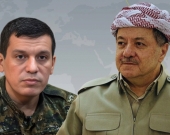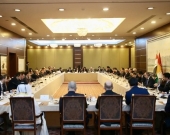For Many Iraqis, Kurdistan is the Place to Go for Good Healthcare

ERBIL, Kurdistan Region - “This is the third time I’ve come to Erbil from Baghdad for medical treatment,” explained Habib Hiluwfahad as he awaited a doctor’s appointment for an ongoing back problem at a hospital in the autonomous Kurdistan Region in northern Iraq.
“All the good doctors are leaving Baghdad, it’s risky to get treatment in Baghdad and the success rate is low, so to get good treatment you need to leave,” Hiluwfahad explained, as he sat in the cafeteria of the Turkish Private Hospital in the Kurdish capital.
Across hospitals in Erbil, the same story was echoed by patients, doctors and nurses: Since the 2003 US-led invasion that toppled Saddam Hussein, there has been a mass exodus of doctors from Iraq; people often cannot receive the medical care they need, forcing them to seek treatment elsewhere.
For many, the answer is found in the three-province Kurdistan Region, which lies about 350 kilometers north of Baghdad and remains violence-torn Iraq’s only oasis of calm and economic growth.
People are tired from the security situation in Iraq,
“People are tired from the security situation in Iraq,” said Dr Dakhil S. Khuder, a surgeon at Erbil’s Al Rasul New Hospital. “Doctors can’t treat patients properly and they can’t follow up on their patients during the night. Here, because Erbil is more safe and stable, they’re free,” he said.
Dr Reda al-Majidi, an orthopedic specialist at Al Rasul, is one of the doctors who relocated to Erbil to escape the violence in Baghdad.
“In Baghdad, doctors are the targets of terrorism, so most have fled for their own safety,” he explained. “Many doctors have come to Erbil and the patients have followed the doctors here.”
Alborz Ali, a translator at the Turkish Private Hospital who interprets between staff and patients speaking Kurdish, Turkish, Arabic, Farsi and English, said that in the two years that the hospital opened most of the patients have come from Baghdad and other parts of Iraq.
Taleb Wahab Saad, accompanying an ill friend from Baghdad, described the frustrations and difficulties patients experience when they try to see a doctor anywhere else in Iraq. “There are few doctors and many patients, so you must wait a long time to get treatment, which is a big problem if you have an emergency.”
Mariam Jalalvand, a nurse at the Turkish Private Hospital, said some patients end up very ill by the time they reach Erbil.
“I have one patient now whose illness went undiagnosed for two weeks while she was getting treatment in Baghdad. Now, she’s here, but it’s taking her a long time to recover because of the initial delay in her treatment,” Jalalvand said.
Cardiac surgeon Dr Mert Yilmaz explained that the aim of the Turkish Private Hospital is to keep Iraqi patients in Iraq. “We don’t want patients to leave Iraq for treatment, for example to Turkey, Jordan, India or the UK. Erbil is much closer for patients when they need treatment immediately.”
Kurdistan is part of Iraq, why do we need residency to come here?
Yilmaz said that while there are many excellent and experienced resident doctors in the Kurdistan Region, specialists are brought in from Turkey when needed for difficult cases, which helps make it easier for patients to remain in Iraq for full treatment.
He noted that before the war, there were many good doctors in Baghdad, an opinion affirmed by all the doctors and nurses interviewed. Then, people from Kurdistan would travel to Baghdad to receive the superior treatment available there. But since 2003, that trend has reversed.
For Amal Abd Ali, another patient from Baghdad, the treatment in Erbil is expensive in comparison, but she accepts the expense for the sake of her health. She acknowledged that, compared to treatment outside Iraq, Erbil is still less expensive.
“Here, we’re comfortable and the doctors and services are very good. In Baghdad, I was in the hospital for two weeks, but they couldn’t diagnose my illness and didn’t do anything for me. Then I came here and began getting treatment and I’m finally getting better,” Ali said.
I just tell them I’m coming for medical treatment.
But she complained that, although the Kurdistan Region is part of Iraq, outsiders still need permits for stays longer than a week. Ali’s diabetic complications mean her treatment will take longer, but her husband and daughter were only given seven-day visas.
“Kurdistan is part of Iraq, why do we need residency to come here?” she questioned.
Whether they came to Kurdistan overland or by plane, the patients themselves said they experienced no difficulties entering Kurdistan for treatment.
“It’s easy to travel here for medical treatment. I travel by plane and haven’t faced any difficulties on all three of the trips I’ve made,” Hiluwfahad said. “I just tell them I’m coming for medical treatment.”
Rudaw












